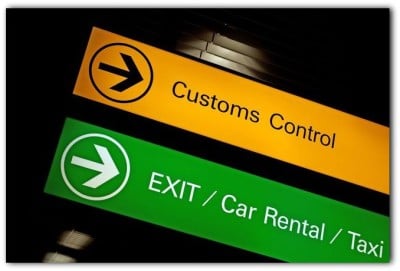
How to Import Household Goods — The Ultimate Guide
5-minute read 3
Our clients often ask us about the goods that are restricted for importing to New Zealand. Can one bring necessary medicine, favourite DVD collection or some rare artwork as an unaccompanied baggage?
Despite New Zealand’s reputation of having a very strict rules at the border, a person can import almost every possible household item apart from prohibited by International law goods. The main rule – declare everything on your packing list! Here is the guide which helps to answer the most common questions about importing household goods to New Zealand.
All household goods must be cleared with the Customs service and MPI (Ministry for Primary Industries). If you are an immigrant, or a resident returning to New Zealand after 21 months or more overseas, you will be entitled to certain concessions on household items and similar possessions that you wish to bring in.
DOCUMENTS REQUIRED
- Completed Customs & Quarantine Declaration (Unaccompanied Personal Baggage Declaration)
- Packing List
- Copy of your passport
- Copy of relevant *visas (for immigrants)
- Letter of authorization from the owner/importer if goods are being cleared on their behalf
- Any treatment/cleaning certificates in respect of the goods you may have
- Any relevant approvals for prohibited or restricted goods
- Copy of prescription for any prescribed drugs
*Visas means any of the following:
- A current New Zealand residence visa, or a current returning residents visa
- A current permanent residence visa (including a resident return visa) issued by the Government of the commonwealth of Australia
- A current New Zealand work visa that was issued for a minimum of 12 months
- A current New Zealand work visa, issued under the Work to Residency (Skilled Migrant Category) policy or the Long Term Business Visa category
- A current New Zealand visitors visa that was issued for a minimum of 3 years

CUSTOMS CLEARANCE
Household goods can be imported free of duty and tax (GST) provided they are imported by a person who…
- Has arrived in New Zealand; and
- Holds a New Zealand/Australian passport of one of the following relevant visas in New Zealand at the time of importation of the goods; and
- Has resided outside of New Zealand for more than 21 months; and
- Has owned and personally used the goods prior to importation into New Zealand.
The goods must not be for any other person, or for gift, sale or exchange or used for commercial purposes. If the client does not meet all of the above requirements then full customs duty & tax (GST) will be payable.
Currently New Zealand Customs may allow on a case by case basis the import of goods prior to the client’s arrival into New Zealand. Providing the client meets the concession New Zealand Customs will apply a monetary bond which is refundable upon presentation of passport and receipt within six months of the arrival of the goods. This is not official Customs legislation and could be changed at any time.
Prohibited or restricted goods are but not limited to:
- Articles manufactured from wildlife including but not limited to reptiles, snakes, elephants, rhinoceroses, hippopotamuses, members of the cat family, whales, dolphins, zebras, antelope, deer, birds, feathers, coral or shells
- Medicines of any kind
- Controlled drugs other than prescribed medicines including but not limited to LSD, heroin, cocaine, cannabis, ecstasy, steroids, human growth hormone, performance enhancing drugs, precursor substances
- Objectionable/Indecent articles of any kind in any format including but not limited to child pornography, material depicting bestiality, or material which may promote, incite, or instruct in matters of crime or violence, or misuse of drug
- Ornamental pipes including sheesha pipes, hookah pipes and other cannabis or meth-amphetamine utensils
- Weapons of any kind including but not limited to firearms or parts thereof, replica firearms, bayonets, daggers, sword sticks, spring-bladed knives or knuckle dusters. The importation of firearms is strictly controlled and a police permit to import is required
Specific items that you are required to declare:
- Cigarettes, cigars, tobacco or alcoholic liquor
- Goods for commercial purposes (including goods for sale, lease, hire, exchange or use in your own business)
- New goods
- Unused goods being goods that you (or your family) own but have never used or unused gifts to you
- Gifts intended for other persons
- Goods belonging to any person not listed on your Unaccompanied Personal Baggage Declaration.
- Motor vehicle(s), motorcycle(s), caravan(s), trailer(s), watercraft or aircraft
- Cash in any currency to the value of NZ$10,000 or more

QUARANTINE PROCEDURES
New Zealand is known internationally for its clean, green image and reliance on agricultural and horticultural, forestry and tourism sectors. Controls must be maintained against unwanted contaminants, diseases, insects and other pests. All packing/inventory lists are screened by the MPI Quarantine service to determine whether a consignment requires an examination or can be released immediately.
Most shipments of import household goods will require an inspection of some degree. Common items that are inspected and of Biosecurity interest are but not limited to:
- Food of any kind
- Animal products such as meat (fresh or dried), eggs, dairy products, honey, skins, fur, feathers, bone, wool, hair, hunting trophies, fish/shell fish (fresh, dried, or frozen), Chinese traditional medicines, shells and coral, ivory
- Plants or plant products such as fresh or dried fruit and cones, vegetables, plants/flowers live and dried, plant cuttings and bud wood, bulbs or roots, seeds, pine antique and/or handcrafted wooden ornaments/carvings, cane, bamboo, basket ware, straw, Chinese traditional medicines
- Equipment used with animals and/or plants such as veterinary equipment/products, fishing gear, fish farming equipment, saddlery, work boots/clothing, pet bedding, gardening equipment/products and forestry equipment
- Miscellaneous items such as Vacuum cleaners, spiked, studded or sprigged footwear (e.g. golf shoes, soccer boots), hiking boots, soiled footwear, water sports equipment, bicycles, boats, vehicle parts, camping equipment/tents, barbeques, Christmas and/or Easter decorations
Some items may be directed by the MPI officer for cleaning/treatment or fumigation. It is also possible for items to be seized and destroyed or shipped back to the origin Country at the owner’s expense. It is recommended that all items that have come into contact with soil, grass/leaves/vegetation, water, seeds, animals, and insects should be thoroughly cleaned and free from any contamination.
Wood Packaging:
Any wood packaging used in shipments (crates, pallets etc) must be constructed of approved treated timber and meet and display the internationally recognized ISPM 15 standard. Any non-compliant timber may be destroyed, treated or re-exported to the Country of origin at the owner’s expense. All International removal companies should be aware of this standard and supply compliant timber and crating.
The above information is intended as a guide only. Regulations can change without notice and for specific guidance, we strongly recommend that you contact our specialists.
P.S. Do you know of other people that will find this article useful? Awesome, please share it on social media. Thank you!
